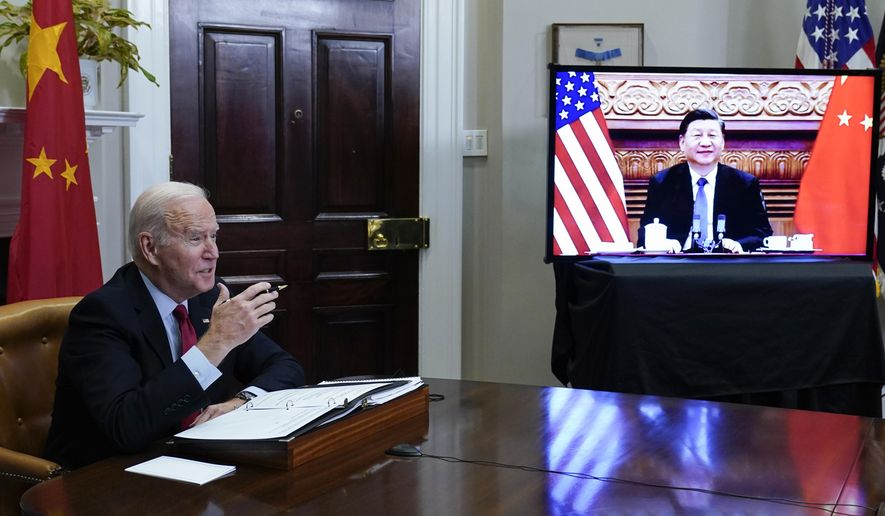President Biden held a virtual call Friday with Chinese President Xi Jinping as the U.S. leader seeks to deter his Chinese counterpart from worsening the Ukraine crisis by bolstering its alliance with Moscow.
The call began at 9:05 a.m. and ended at 10:53 a.m., according to the White House.
Mr. Biden was expected to warn Mr. Xi that his country will pay a serious price if it provides Russia with military and economic aid for its war in Ukraine.
In its readout of the call, the Chinese government said Mr. Xi stressed the role the U.S. and China must play together in ensuring world peace and said Beijing was pushing for an end to the fighting in Ukraine.
“The Ukraine crisis is not something we want to see,” Mr. Xi told Mr. Biden, according to the official Xinhua news agency.
The Chinese government version said the events unfolding in Ukraine “should not come to the point of meeting on the battlefield,” but avoided any direct criticism of Russian President Vladimir Putin’s decision to invade last month.
SEE ALSO: Russians lose morale, offensive stuck in neutral as invasion entered its fourth week
China’s official press has largely embraced Russia’s view of the conflict, saying NATO’s expansionist policies in eastern Europe were the root cause of the fight and parroting Moscow’s claims that the U.S. was running a secret network of bio-labs inside Ukraine.
But the Chinese regime has also staunchly denied U.S. suggestions it was aiding the Kremlin militarily in the fight, and Mr. Xi in recent days has broken with Mr. Putin and referred to the invasion as a “war.”
“We will not hesitate to impose costs,” U.S. Secretary of State Antony Blinken said.
Mr. Biden was expected to deliver a similar message during his call, as he walks a diplomatic tightrope. He can’t risk angering China and escalating tensions between Beijing and Washington while he’s also staring down Russian aggression in Ukraine. But at the same time, Mr. Biden needs to be wary of cooperating with one of the U.S.’s largest geopolitical rivals.
The first major challenge Mr. Biden faces is convincing Mr. Xi to disavow Russia’s actions in Ukraine. While the war has drawn widespread condemnation across the globe, Beijing has maintained relatively quiet.
“This is an opportunity for President Biden to assess where President Xi stands,” White House press secretary Jen Psaki said Thursday. “The fact that China has not denounced what Russia is doing, in and of itself speaks volumes.”
SEE ALSO: Russia blocks hundreds of ships from leaving the Black Sea region
Still, Mr. Biden’s biggest challenge will be to dissuade Mr. Xi from offering any aid to Russian President Vladimir Putin. Any assistance from China would be incredibly valuable to Moscow. It would allow him to offset some of the economic devastation caused by sanctions imposed by the West and allow him to sustain his efforts in Ukraine.
It was reported this week that Russia has asked China for military support and economic assistance after the invasion. China has expressed interest in offering help to Mr. Putin, U.S. officials have said. Both China and Russia deny the claims.
Still, Russia sees China as an economic lifeline.
Russian Finance Minister Anton Siluanov said Sunday that his country’s economic partnership with China is critical “in an environment where Western markets are closing.”
For example, China could help get around a U.S. ban on selling high-tech equipment to Russia by purchasing American products and then selling them to Moscow.
Earlier this week White House National Security Adviser Jake Sullivan warned his Chinese counterpart of strong consequences if Beijing helps Russia wage war in Ukraine. However, what those penalties might be have been shrouded in secrecy.
The seven-hour meeting in Rome on Monday was described by the White House as “intense.”
• Jeff Mordock can be reached at jmordock@washingtontimes.com.
• David R. Sands can be reached at dsands@washingtontimes.com.




Please read our comment policy before commenting.